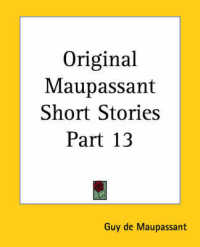- ホーム
- > 洋書
- > 英文書
- > Business / Economics
Full Description
Bringing together for the first time distinguished Gulf experts to analyse the renewed geo-economic prominence of the Gulf states, this volume investigates some of the 'new power brokers' in the world economy: the oil-exporting states of the Gulf. The Gulf Cooperation Council's (GCC) members: Bahrain, Kuwait, Oman, Qatar, the United Arab Emirates and Saudi Arabia, collectively have the largest proven oil reserves in the world and are among the world's largest oil-exporting states. Gulf Arab states are actively pursuing a variety of foreign investment strategies. Some of these investments are being managed by sovereign wealth funds, government investment corporations, and government-controlled companies. This renewed geo-economic status has received a lot of media attention but there has been a dearth of academic study on what this shift in global economic power means for the international economic system. This volume aims to fill this gap with a rigorous scholarly analysis based on primary sources and raw economic data. It brings together the expertise of academics who have devoted their career to careful study of the region and of renowned scholars of international political economy.
Contents
Introduction: The Geo-Economic Power of the Gulf, Bessma Momani, Matteo Legrenzi; Part I Economic Diversification and Rentier Politics in the Gulf Arab States; Chapter 1 Gulf Arab States' Investment of Oil Revenues, Mary Ann Tétreault; Chapter 2 The Political Economy of Monetary Integration and Exchange Rate Regime in the GCC, Giacomo Luciani; Chapter 3 Economic Diversification in the Gulf Arab States: Lip Service or Actual Implementation of a New Development Model?, Martin Hvidt; Chapter 4, Steffen Hertog; Chapter 5 Institutional Competition and Symbiosis in the Gulf: The Politics of Efforts to Establish an International Islamic Financial Policy Forum, Andrew Baker; Chapter 6 Oil and Financialization in the Gulf Cooperation Council, Samer N. Abboud; Part II Gulf Arab Investments and Trade; Chapter 7 The GCC's International Investment Dynamics: The Role of Sovereign Wealth Funds, Rachel Ziemba, Anton Malkin; Chapter 8 Arab Sovereign Wealth Funds: The Challenge of Transparency, Sara Bazoobandi, Tim Niblock; Chapter 9 Gulf Arab Sovereign Wealth Funds: Governance and Institution Building, Sven Behrendt; Chapter 10 Shifting Gulf Arab Investments into the Mashreq: Underlying Political Economy Rationales?, Bessma Momani; Chapter 11 The Gulf Arab States and Asia Pacific: Geo-Economics and Interdependency, Christopher M. Davidson; Chapter 12 Geo-Political Complications of US Free Trade Agreements with Gulf Arab Countries, Fred H. Lawson; conclusion Conclusion - Repositioning the Gulf: The GCC in the Twenty-First Century Global Political Economy, Crystal A. Ennis, Paul Doherty;








